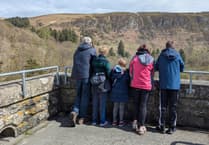Powys County Council is set to debate whether to introduce a tourism levy on overnight visitors to the county.
A report on the Welsh Government’s proposed levy will be considered by councillors at a meeting of the council’s Economy, Residents and Communities scrutiny committee on Thursday, September 4.
The Visitor Accommodation (Register and Levy) Etc. (Wales) Bill is Wales’ first locally designed tax. The legislation was approved by the Senedd in July and is expected to receive Royal Assent later this year.
The levy is a charge on overnight accommodation and would cost £0.75 (75 pence) per person per night for those staying at campsites and hostels, excluding people under 18.
For those staying in all other types of visitor accommodation it would cost £1.30 per person per night.
The Welsh Government say that if all local authorities introduced this levy, it could generate up to £33 million a year across Wales.
This money could be used by councils to invest in infrastructure, especially that which is associated with tourism.
Five options outlining how the council could address the levy will be discussed by councillors.
The report said: “Implementation of the levy itself is discretionary for each local authority and cannot occur before 2027 as it must be preceded by a consultation.
“Collection will be managed by the Welsh Revenue Authority (WRA) on behalf of any local authority that chooses to implement a visitor levy.
“The tourism sector in Powys and Mid-Wales has expressed strong concerns about the proposed levy.”
The report adds that Mid Wales Tourism (MWT) Cymru, a body that represents over 600 tourism and hospitality businesses across Powys, Ceredigion, and the Meirionnydd part of Gwynedd, has called for a delay in its implementation.
Director of corporate services and section 151 officer Jane Thomas said: “The discretionary nature of the visitor levy presents both opportunities and risks for the council.
“While the potential for generating additional income to support tourism-related infrastructure is noted, the financial implications of implementation - particularly the costs associated with consultation, administration, and compliance - must be carefully considered.
“The sector’s concerns regarding affordability and competitive disadvantage also warrant attention.”
“Officer advice is that option two offers a proportionate and financially prudent approach, allowing the council to engage with stakeholders and gather evidence before committing to a course of action.”
The five options for councillors to consider are:
• Not to implement the levy.
• Minded not to implement the levy, but undertake an engagement exercise with the residents, businesses and tourism stakeholders of Powys to gather evidence and views on this decision.
• Implement the levy and use the income to support general council services when the work impacts on visitors, this means – street cleaning, public toilets, parking, waste/recycling services, rights of way maintenance and public transport.
• Implement the levy and use the income for more tourism specific infrastructure, visitor marketing, visitor information and site-based interpretation, tourism development projects.
• A mixture of options three and four.
Comments and advice from the committee will be added to the report which is expected to be discussed by the Liberal Democrat/Labour cabinet at a meeting later this month.




Comments
This article has no comments yet. Be the first to leave a comment.